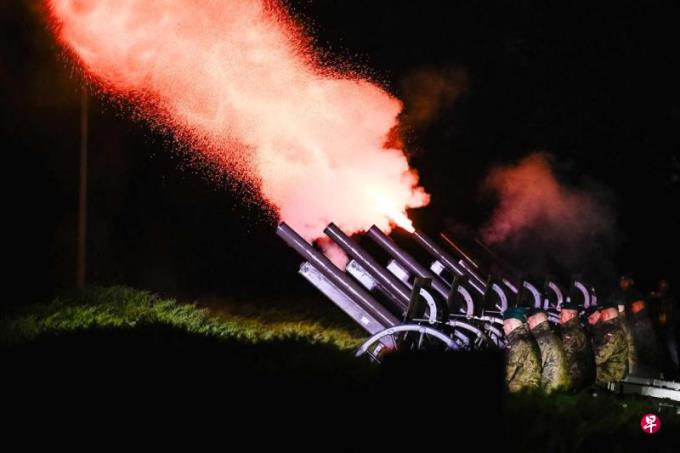
The US strategyist Joseph Nai once summarized the lessons: Democratic countries should appease Germany appropriately before World War I, and to resolutely curb Germany before World War II.Maybe that's it!The problem is that if there is no corresponding transformation of the world system and international system, can appeasement or curb, can it really eliminate war, or just postpone the war?
Since 2008, China and the United States have continued to intensify.In 2014, Russia annexed Crimea. After the end of the Cold War, the "single -pole time" of the United States dominated the world; the world returned to the era of competition in the past.In February 2022, China and Russia publicly announced that they would work together to challenge the western -led liberal international order.The occurrence of the Ukrainian war and the camp of the world's political structure have greatly deepened people's concerns about the explosive new world war.
Some strategists in the United States based on the theory of power transfer, inferring China, which has been "seeing the top" -just like Germany, which is surrounded by the strategic surrounds of the Nations before the war, and the relative decline of the country's national strength -has a strong tendency to launch war and advocates that the United States preemptive personnelEssenceAfter the 20th National Congress of the Mainland Government, the Supreme Leaders and the Military also proposed to "prepare to fight."The new world war seems to be a prediction of self -realization.
The World War II is the hegemony of the great power, which is a large -scale war on the damage and reconstruction of the major powers around the potential.As far as the ultimate goal of war is concerned, the essence of World War I was British hegemony, and the essence of World War II was a virtue.The common point of the two wars is that the conflict between the world system and the international system has led to the inability to maintain Europe. As the number one power power, the United Kingdom maintains the same potential and collides with Germany, leading to the globalization of the European war.
Capitalism is a world system. Unlike an international system as a political concept, the world system is an economic concept, referring to the intertwined vertical division of labor between the economically developed primary country and the underdeveloped colony and the country.For the later capitalist power, although the first wave of globalization (1870 to 1914) provides an output channel for its products, to maximize profits, it is necessary to rely on national power to seize the colonies and establish an overseas empire.
"Empire Construction" has dual economic and political meanings
The basic characteristics of the international system are Power Politics. In the era of imperialism (1890 to 1945) in the imperialist hegemony, the reasons for the existence of the empire are not only reflected in the exploitation of facilities, but also brought by the international systemThe country's survival pressure.This makes the "Empire Construction" have the dual economic and political meanings: economic meaning is to provide raw materials and markets for the primary kingdom, and the political meaning is to ensure that the primary country is strategically self -sufficient (Strategic Aut could), that is, to ensure that once the mast of the country is in war, it is guaranteed to be being warmed in the war.The enemy country cuts off trade and still has plenty of food sources and most of the raw materials required for industrial and arms production.
In the era of imperialism, the importance of self -sufficiency has made the empire the "private property" of the sovereign country that must not be to be dyed in other countries, which means that the primary country and the colonies may be transformed into a closed trading group at any time.As the later parties of the "Empire Construction", Germany, without maritime advantages at the end of the 19th and early 20th century, could no longer capture resources with rich resources like Britain, and can connect the naval bases into a large colony; it in Africa and andA small number of colonies possessing in Pacific cannot be compared with the British Empire in terms of economic value or strategic sense.The non -openness of the colonial empire itself makes Germany unable to obtain the benefits of raw materials; given the huge demand for raw materials during the wartime of the industrial era, Germany, which has a serious lack of coal resources, is the only strategic choice.The scope of expansion forces is to build a resource foundation for the survival of the country and compete for European hegemony.
However, this choice has caused great moral and strategic dilemma to Germany.The establishment of an overseas empire through colonial conquest for other European powers will not affect European balance in the short term. However, Germany's internal expansion in Europe will immediately cause the European balance to collapse, causing a strong response from other powers including the Austro -Hungarian Empire.The British response is the strongest, because once Germany achieved its war goals, whether it was the Schrypen Plan (1905) or the picture presented in the September plan (1914), neither was reconstructed by the Napoleon Empire.This is what Britain, which has always pursued the offshore balance policy, tolerate. Some historians have pointed out that even if Germany does not destroy Belgium neutrality, Britain will participate in the war.
Participate in the British National Games in World War II
But it was Britain's refusal to accept the "Emperor's EU", which caused a fundamental reversal of the British National Games.Historian Neil Ferguson believes that Britain's decision to participate in the war has made this rapid battle that was originally limited in Europe and evolved into a protracted world war.If the UK is in trouble, not only can the overseas empire ensure that there is no risk -this is the foundation of maintaining the status of the British superpowers, and then the Soviet -Russian revolution, the rise of the Nazis, and the Second World War will no longer occur.Europe -ending British financial hegemony -providing opportunities for multiplication.
During the Two World War periods (1919 to 1939), the conflict between the world system and the international system not only did not alleviate, but instead further expanded due to the Great Depression of the World Economy.Germany was deprived of all overseas colonies after the First World War. During the Great Depression (1929 to 1933), countries have implemented the extreme economic nationalist policy with neighbors as the neighbors, and the victory over the national empire system has been strengthened.For example, Britain implemented the "Imperial Preferences" in 1932 to separate overseas empires from the world market to prevent other countries from dumping products and obtaining raw materials.This stimulates other big powers, especially the desire to expand in Germany and Japan with no or lack of colonies.
In my book (1925), Hitler clearly stated that it was necessary to seize the huge survival space west of Ural Mountain to the Germanic nation.The logic behind it is to obtain all the materials that can ensure that Germany's self -sufficiency is self -sufficient as the basis for dominating Europe and the United States to compete for world hegemony.At the beginning of Hitler's ones, Germany's relationship with the international system led by Britain and the United States -whether it was cooperation or confrontation -has been swinging, and there is no shortage of technical bureaucrats that adhere to a certain internationalist tendency, such as Economic Minister of Economic Minister Shaht.However, the Dumin depreciation decision made by the Roosevelt government in April 1933 crushed the remaining enthusiasm of Germany to return to the international system.In December of the same year, Germany announced the withdrawal from Germany and friendship, trade and consular relations (concluded in December 1923), and instead strengthened economic connection with Southeast Europe and Latin America, which is rich in resources.
Germany's crazy expansion of the army made Roosevelt worry.In December 1936, shortly after the election was re -elected, he proposed to several major countries to hold a second European Peace Conference to discuss the division of disadvantages, trade and colonials, and tried to moderately meet Germany's demand for raw materials and slow down its arms expansion.pace.This proposal cannot be echoed by other big powers. Hitler insists on the position of self -sufficiency and reorganization. With the support of the economic tsar Herman Gorin and the National Defense Force, which is responsible for the "four -year plan" (proposed in August 1936).It's even tough.In the end, several major powers in the United States and the Soviet Union expanded their arms to deal with the upcoming world war.
Hitler has never really regarded Britain as the enemy, but hopes to alliance with it to fight against the United States together.Before Churchill came to power, the possibility of Yingdehe and Hepho always existed.If you succeed, Germany is likely to conquer the entire Europe in a long time; with the establishment of the new European order under Germany's rule, the world will enter the long -term cold war between the "Nazi Europe" and the United States.However, Britain chose to resist to the end, although this sacrificed the British National Games, but eventually ushered in liberation in Europe.
American Strategic Family TreatyThrus has summarized the lessons of the two wars: Democratic countries should appease Germany appropriately before World War I, and before World War II, they must resolutely curb Germany.Maybe that's it!The problem is that if there is no corresponding transformation of the world system and international system, can appeasement or curb, can it really eliminate war, or just postpone the war?
The author is a visiting scholar at the School of Political Economics of London




